|
Interview with Sheetal Sheth on Bravo Anjali! By Rashmi Bismark Rashmi: Hi Sheetal - We are so excited for the continuation of your Anjali series with Mango and Marigold Press! This is the first picture book series featuring a South Asian American main character. How thrilling! So in Always Anjali, we saw Anjali navigate issues of bullying as she reclaimed meaning and pride in her name. What can we expect from her in your latest book, Bravo Anjali!, which was released on September 21, 2021? Sheetal: In this installment, we see how Anjali deals with being the only girl in the room. She has to decide if she's going to take her space and own her excellence. Rashmi: Wonderful, and we see Anjali really come into her own in Bravo Anjali! as she faces some challenges with her peers around sharing her talents unapologetically. While she plays her musical instrument with more confidence and finesse, it seems like the kids in her class resent her. She wonders how to balance her friendships with her burgeoning creative strengths. This is such an intriguing conflict to explore. Plus you have added some gender dynamics into it as well. What led you to highlight these issues? Sheetal: I wrote Bravo Anjali! during the height of the #MeToo movement. The Hillary/Trump election really took things to a whole new level and I was disturbed at the level of misogyny and sexist vitriol I was seeing 24/7. I decided I wanted to tackle this, but in kidtalk. How can I bring this conversation to our kids? It’s abundantly clear we need to be having these conversations with our children. Young. It’s the only way we will move the needle forward. So in this book, Anjali is the only girl in her class (which is quite common) and she’s the best. The boys don't like it. And so the story begins... Rashmi: Can’t wait to see what unfolds! Bravo Anjali! showcases Anjali's relationship with classical Indian music, particularly with a beloved percussion instrument - the tabla. Were there any experiences in your own life that inspired this exploration? Why the tabla? Sheetal: I LOVE the tabla and so wish I could play it! But really, any excuse to bring music into the conversation and celebrate the tabla! Even though I don't play the tabla, it really bloomed from the idea that I wanted a way to talk about the themes of misogyny and friendship and delve into the everyday microaggressions that can happen. The tabla is a traditionally male dominated instrument so it was the perfect entry point. Rashmi: In addition to writing, you are a very talented actor, producer, and advocate. How has your work in film and activism with organizations like Equality Now and others enriched your writing? Sheetal: It's impossible to separate. I am a storyteller and all of my life's experiences and values are poured directly into my writing. I am always going to want to center the traditionally marginalized. I will always want to share and champion the stories that come directly from all my other work as I know it's imperative. And I will also push the narratives. I think there is nothing we can't talk about with our children. I know they want 'in' on these conversations. They crave them and need them. So I am always looking for ways to layer in something more while also keeping the books accessible and entertaining. Rashmi: I love that. So what message do you hope readers come away with after reading Bravo Anjali!? Sheetal: To 'never dim your light!!' But also, I wanted to give our boys and girls language and space to talk about these big feelings they may have. Rashmi: I just have to ask... Is there another Anjali book in the works? What can we expect from Anjali as the series continues? Sheetal: YES! I have already written the third book and it is slated to be out next fall. You will see Anjali's world continue to expand in many ways! Rashmi: I’m sure there are lots of Anjali fans out there (including me) who are happy to hear that! Anything else you'd like to add? Sheetal: Thank you for this community. I love this tribe and appreciate you all so much. Rashmi: Thank you, Sheetal, for joining us, and thanks for all the work you do. Bravo Anjali! by Sheetal Sheth, illustrated by Lucia Soto, and published by Mango and Marigold Press is available now. Always Anjali (illustrated by Jessica Blank) is Sheetal’s multi-award winning debut and the first book in the Anjali Series. More about Sheetal Sheth: Despite being told she’d have to change her name to work, Sheetal persevered to become an award winning actress and producer, known for her provocative performances in a wide range of memorable roles on film and television. Sheetal puts a spotlight on under-represented groups, not only through her trailblazing work as an actor, but also by being an outspoken advocate. Sheetal served in President Clinton’s AmeriCorps, is on the advisory board of Equality Now, and is an ambassador for The Representation Project. She believes if you can dream it, you can be it - even if you don’t see it. Sheetal, her husband, and their two kids live in New York and Los Angeles.
http://sheetalsheth.com KidLit in Color author Tonya Abari interviews Ashley Franklin about her new book Better Together, Cinderella released September 9, 2021. Tonya: What do you hope children and adults will gain from reading Better Together, Cinderella? Ashley: I hope that they gain a new appreciation for the power of a child’s imagination. Tameika not only imagines a magical evening for herself, but one that encompasses her family. I also hope that kids with siblings realize that their personal, shining light doesn’t diminish just because the sizes of their families have changed. Tonya: Just like in Not Quite Snow White, you seamlessly include a classic fairy tale into a modern, yet timeless narrative. Can you explain your process for selecting which parts of the classic fairy tales to feature (and how much you wanted to include) in your own manuscripts? Ashley: Both fairy tales have oodles of retellings, so I wanted to focus on their most memorable components (in my opinion)—beauty & acceptance for Not Quite Snow White and family dynamics & acceptance for Better Together, Cinderella. I wanted those to be the driving forces behind each of my manuscripts while also exploring Tameika’s princess state of mind. Tonya: So many children can relate to welcoming new siblings into the family (and Tameika has double duty on her hands!). How did your own experience as a parent and/or sibling inform the crafting of Tameika’s struggle to find her place as a big sibling? Ashley: I am nine years older than my next sister. In my mind, I was clearly cemented as my mother’s only child, so I was not a fan at first. My bitterness grew when my mom dressed us alike. She’s my best friend now though. My own boys are 2.5 years apart. For the entire time that they’ve occupied Earth at the same time, I’ve seen them fight hard yet love harder. I’ve helped them navigate their misunderstandings and stood aside as they have aired their grievances. Capturing the complexities of sibling relationships was foundational in how I shaped Tameika’s emotional journey. Tonya: I just love how Tameika’s best friend and uncle help her navigate becoming a big sister. Can you expand on the theme and importance of community stepping in to help children understand their feelings around life’s changes? Ashley: Honestly, I hate the idea that picture book characters are expected to solve their own problems. I wasn’t raised like that. There was always a relative, friend, or even a neighbor I could turn to. I always think back to the saying, “It takes a village to raise a child.” The guidance of a safe, protective, and enlightened community helps a child to grow to their full potential. Feelings are big—even for adults. The moments between Tameika and Uncle Derrick where he helps her figure out her feelings are some of my favorites. Why not show the beauty of that bond in a picture book? Tonya: You are back for the second time working with Ebony Glenn’s lively and colorful illustrations. Tell us about the author/illustration process for this second book – working with Ebony and co-illustrator, Saba Joshagani. Ashley: It was simple! I was able to ask for things to include (like the girl in the wheelchair and for Khadija’s hijab) and they were great about it. All in all, I really just had no problem putting this story in their more than capable hands. Tonya: After the success of Not Quite Snow White, did you feel any pressure drafting Tameika’s next adventure in Better Together, Cinderella? Ashley: Absolutely! I wanted to keep Tameika’s sweetness but also show her frustration with her new big sister role. It was hard to make sure that she didn’t come across as bratty. Instead, I needed her to come across as lost. In essence, she’s a star who feels lost without being center stage. Tonya: We all know that publishing is very top secret, but can you give us the scoop – or at least a subtle hint – on what you’re working on next? Ashley: Sigh. So many NDAs 😞. I can mention that I have at least one picture book scheduled for 2023, and that’s Xavier's Voice with Innovation Press. I’m also trying my hand at writing a middle grade novel. It’s a wonderfully terrifying experience to branch out from picture books. 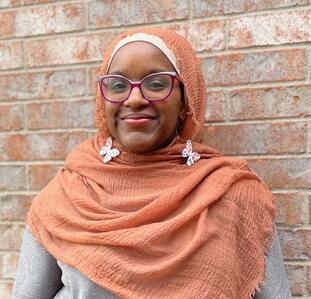 Ashley Franklin is a writer, mother, and adjunct college professor. She received her M.A. from the University of Delaware and B.A. from Albright College, both in English Literature. Ashley is the author of Not Quite Snow White (2019), “Creative Fixes” from the anthology Once Upon An Eid (2020), “Situationally Broke” from the anthology What We Didn't Expect (2020), and Better Together, Cinderella (2021). She’s also had several pieces published on popular online platforms such as Romper, Complex, About Islam, Medium, and more. Ashley grew up in Maryland, but she has also called Pennsylvania, Delaware and Louisiana home. She currently resides in Arkansas with her family. Website: ashleyfranklinwrites.com Twitter: @differentashley Instagram: @ashleyfranklinwrites Interview with Saadia Faruqi on Trauma, Islamophobia and 9/11 by Aya Khalil Aya: Hello, Saadia! I am so happy I get to interview you for Kidlit in Color about your new upcoming middle grade book, Yusuf Azeem is Not a Hero, which comes out on September 7 from Quill Tree Books/Harper Collins! Can you please tell our readers a brief summary of your book? Saadia: Thank you for interviewing me! This book is about 9/11 and the experiences of the Muslim American community in the last twenty years. The main character, eleven-year-old Yusuf Azeem is looking forward to starting middle school and participating in a regional robotics competition. When school begins and bullies start coming out of the woodwork, he realizes that this year is going to be more difficult than he thought, because it’s the twentieth anniversary of the 9/11 terrorist attacks. A group of white supremacists are riling the townspeople up, harassing Yusuf’s community, and protesting the new mosque. Yusuf begins to read his uncle’s journal from 2001 to understand the September 11 attacks and how they changed life for Muslims like him before he was even born. As tension escalates, and his friends and family get more scared, Yusuf has to chose whether he will ignore the hostility or stand up and be a hero. Aya: This is such an important topic to discuss in books. Especially from a Muslim perspective. I absolutely loved reading an arc of this book a couple of months ago and it took me back to 2001 when I was in high school during the 9/11 attacks. Can you tell us where you were on that awful day and what feelings crossed your mind? Saadia: Everyone probably remembers where they were on September 11, 2001, what they were doing and feeling. It’s such a visceral, traumatic memory for most people, even those who lived far away from New York City because we were watching things unfold in real time on television and radio. I was in college that year, and I remember my husband calling me from his office to ask if I’d watched the news because he couldn’t figure out if it was a joke or not. I went to campus and everyone was so quiet and serious, not just on that day but for days afterwards, as if all the laughter had been snatched up from the halls. I don’t remember much about how I felt, just that quiet stillness, a wondering of what would happen next. Aya: Many of us were silent out of shock, that’s for sure. I could really relate to Yusuf in this story because I grew up in two small towns: I went to elementary school in North Dakota and I went to middle school in Lima, Ohio. This was pre-9/11 but Islamophobia didn't start after 9/11, so I remember a lot of micro-aggressions and racism then. Why did you write this story and why is it important to tell? What about Muslims kids who are growing up small towns now and facing similar experiences; what do you want to say to them? Saadia: Islamophobia has been prevalent in the U.S. since the first Muslims arrived on these shores. It’s human nature to fear and hate what we don’t understand, and media always twists how people are represented in ways that are very negative and hurtful. I wrote this story because I was tired of these media depictions, especially around the anniversary of 9/11 each year. I wanted to highlight all the ways Muslims have been demonized and misrepresented, bullied and hated, in the last twenty years. It’s personal to me because as a Muslim mother, raising Muslim kids, the prejudice is too close to home and just cannot be ignored. I want to tell Muslim kids that I see the bullying you endure, and the ways you feel unwelcome in your schools and neighborhoods just because of your faith. I want to tell them that your experiences are valid, and that you’re not alone. Aya: Yes, so important to validate those feelings. I don't want to give too much away or for spoilers, but there's a central part in the story that made me emotional. It was when the Muslim families were working hard to build the mosque and they were faced with lots of hate and pushback from the community. It reminded me when my friends and I gave a presentation at a local place to "convince" people to build a mosque in our community. We were faced with so much hostility and the city turned our proposal down. I still think about it often. Why did you choose to write about this and is this based on any experiences you have faced? Saadia: One of the central plot points of this book is obstructing the construction of a mosque that Yusuf’s Muslim American community is building. After many attempts at stopping construction through intimidation, a white supremacist group complains to the city government and holds a zoning meeting to achieve its aims. Although I don’t have personal experience in this, I learned while I was exploring 9/11 and its repercussions that this happens throughout the U.S. on a regular basis. In fact, the ACLU monitors anti-mosque activity including violence, vandalism and the use of city zoning laws to block construction. More examples are available here (https://www.aclu.org/other/mosques-and-community-centers). Aya: Thanks for sharing that link. What do you hope readers will gain or understand after reading Yusuf Azeem is Not a Hero? Both Muslims and people of other faith? Saadia: My biggest hope is that readers will understand the long-term repercussions of 9/11 in our culture and society. When we discuss 9/11, we mostly talk about the attacks themselves, or the victims who lost their lives. We forget about the things that came after: the wars and the government policies, and the prejudice against all those who looked like “the enemy.” For my Muslim readers, I hope they see themselves in this book and take heart that someone is telling their story, acknowledging their pain. For non-Muslim readers, my hope is that they’ll walk a mile in my shoes and see what it’s like to be Muslim American in a post 9/11 world, not so that they can pity us but so that they can demand change from their communities and governments, and so that they can learn to be true allies the way the characters in the book do. Aya: I know it will make readers think and reflect. How long did it take you to write this and what are some challenges, if any, you faced while writing it? Saadia: I’m a pretty fast writer. I think it took me 4-5 months to write this book. My biggest challenge was that once I started writing, I realized I didn’t have all the information I needed to write the historical parts of this book accurately, so I had to pause and conduct interviews of several people to bridge those gaps. Another challenge was writing really emotional and difficult scenes in a way that wouldn’t traumatize young readers but feel authentic at the same time. With time and a lot of revisions, I think I was able to capture the essence of the story. Aya: Thanks for letting me interview you! Fun questions time! Your favorite food? Saadia: Biryani and pizza, but not together. Aya: Your favorite color? Saadia: All shades of blue. Aya: Your favorite city? Saadia: That’s a difficult question. It’s wherever I have loved ones. Aya: What are you currently reading? Saadia: I’m getting started on The Samosa Rebellion by Shanti Sekaran. Order Yusuf Azeem Is Not A Hero here. Saadia Faruqi is a Pakistani American author, essayist and interfaith activist. She writes the children’s early reader series Yasmin and other books for children, including middle grade novels A Place At The Table co-written with Laura Shovan (a Sydney Taylor Notable 2021), and A Thousand Questions (a South Asia Book Award Honor 2021). Her new book Yusuf Azeem Is Not A Hero details the experiences of the Muslim American community twenty years after 9/11. Saadia is editor-in-chief of Blue Minaret, a magazine for Muslim art, poetry and prose, and was featured in Oprah Magazine in 2017 as a woman making a difference in her community. She lives in Houston, TX with her husband and children.
https://saadiafaruqi.com/ |
Archives
July 2024
Categories
All
|
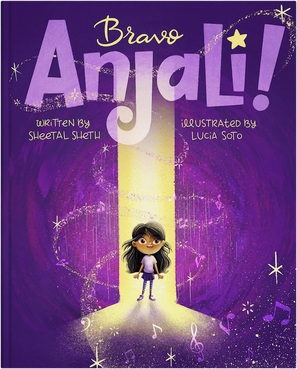
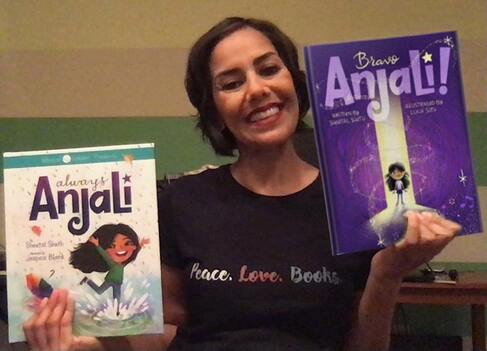
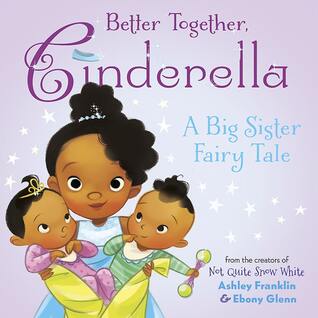
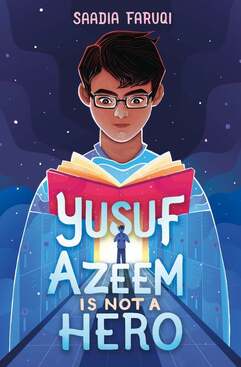
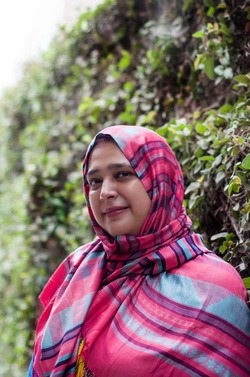
 RSS Feed
RSS Feed



